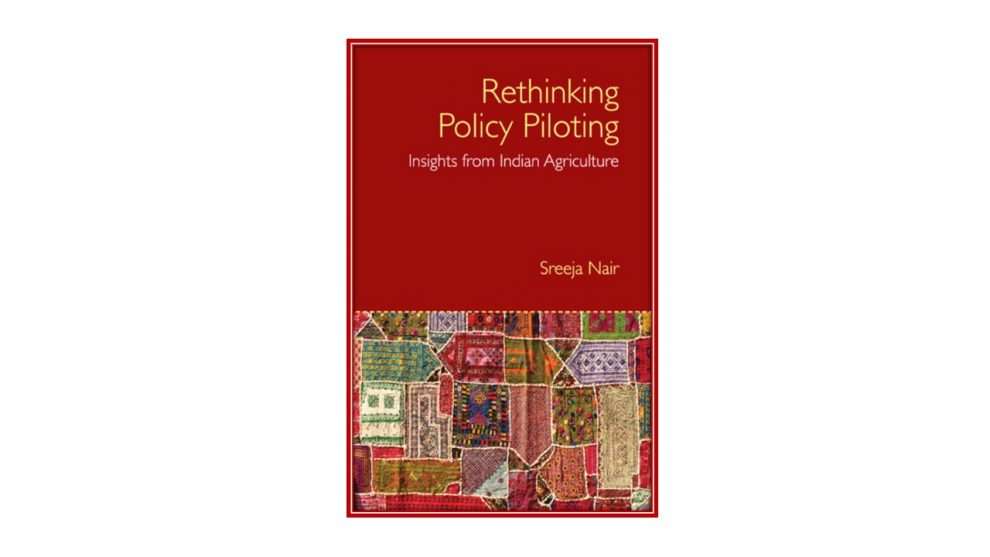Sreeja Nair (2021)
Cambridge University Press, United Kingdom
Pages: 230
Price: INR 869
ISBN 9781108840392
Agricultural policies in India are going through a tumultuous period. Since August 2020, farmers have been protesting against the three farm bills proposed by the Government of India. With the recent announcement by the Prime Minister of repealing the three farm laws, farmers have withdrawn their protest. There were a series of debates on whether the policy was good or bad for farmers. One of the biggest challenges with evaluating the policy was the inherent uncertainty associated with the agricultural sector. How do we design and implement policies under such uncertainty? How can we do that? Will it work? What could have been done, or is there any better approach to implementing policies?
Dr Sreeja Nair, in her recent book titled ‘Rethinking policy piloting: Insights from Indian agriculture’, published by Cambridge University Press, narrates the power of ‘policy piloting’ for understanding how policies work under uncertainties. The book provides insights into designing policy pilots to mainstream them in policymaking. The author is a policy researcher specializing in environmental policy, working as an Assistant Professor at the Lee Kuan Yew School of Public Policy, National University of Singapore.
PREMISE
One of the most commonly heard rhetoric in policy circles is that ‘the policy was good but failed in implementation’. The fundamental issue with this thinking is the failure to recognize implementation as an integral part of policy design. Policy piloting is a well-recognized approach to formulating policies. It helps in pre-testing the policy before rolling it out on a large scale. It also provides an opportunity to experiment with the policy and to redesign it if necessary. Nevertheless, many policies are not piloted, and even when piloting is put into practice it remains ‘under-examined’.
ABOUT THE BOOK
The book is a 177-page short read with five chapters: 1) Rethinking policy pilots in the 21st century; 2) The context of Indian agriculture for piloting; 3) A landscape of agriculture policy pilots; 4) A qualitative comparative analysis of policy pilots; and 5) From piloting to policy: lessons and the path ahead. These chapters comprehensively cover topics ranging from understanding policy piloting, contextualizing them in a sector (agriculture), how the pilots were carried out, and the scope for policy piloting. The author has meticulously built case narratives of 13 projects, which is a guide for researchers working in such exploration.
I have summarized a few highlights from each chapter, which I believe would evoke enough curiosity in the reader to go through the book. Chapter 1 – Rethinking policy pilots in the 21st century – introduces the term ‘policy piloting,’ bringing forth the argument about the importance of policy piloting and how agricultural policymaking has been a test bed for experimentation. The chapter also deals with how the pilots evolve into whole policies, and also provides a framework for studying the design features of pilots. The author makes two arguments, one, that policy piloting need not be in an experiment design (RCTs), and two, the importance of documenting institutional learning.
Chapter 2 details the programmes, policies, and the governance structure of agricultural policies in India. The chapter also describes how the author has selected 13 projects that were piloted for case analysis. Chapter 3 provides the methodology used to collect data for the case study, and details of the 13 agricultural policy pilots and case analysis results are given in Chapter 4.
In Chapter 5, the author summarizes the insights from the analysis of policy piloting in the agricultural sector. Here, I would like to highlight a few points. 1) The term ‘policy experimentation’ and ‘piloting’ are watertight classifications; 2) not all pilots can or should be scaled up as policies or programmes; and 3) pilots are not a start or end by itself, rather they are learning experiences. One of the author’s key points is that ‘policy pilots need not be experimental designs’. We could learn a lot just from piloting them. With understanding gained through the case narrative, the author puts forth three recipes/pathways for the successful diffusion of pilots.
PRAISE AND CRITIQUE
Though it’s a sleek book, it’s a heavy read as it has a lot to unpack, particularly in the first and fifth chapters (serious readers). I would rather say you shouldn’t go by the slickness of the book but by its power-packed punch. I kept making notes on the margins and highlighting many sentences while reading it. The details provided in Chapters 2, 3, and 4 on case analysis and inferences are helpful for any researcher interested in planning to explore such topics. Kudos to the author on analyzing the cases systematically but concisely.
One of my principal contentions – that kept bothering me – was the classification the author made between policy experiment and policy piloting. The author argues that ‘policy experimentation’ and ‘policy piloting’ are not two separate groups, and terms pilots as an advanced form of experimentation. Even though you may agree or disagree with the classification, the exciting discussion and review will provoke you and make you think about it carefully. The author provides a detailed review of the literature in this regard.
The best part of the book is how the author concluded the book by answering the question ‘could piloting of the recent three farm laws have avoided the controversies around it’? The author is honest in making the point and highlighting the challenges with piloting policies due to the political interest around such policies.
TARGET AUDIENCE/WHO SHOULD READ IT?
Given the agricultural sector’s current political and socio-economic turbulence, this book is timely because agricultural policies in India are marred by controversies. It is a good read for those in academia, as well as for students and scholars in public policy who focus on policy analysis. The book is a must-read for policy researchers, particularly those working in agricultural policy. I would also encourage policymakers, politicians, and other stakeholders involved in policy making, to read the book. A wider readership of the book could help encourage ‘policy piloting’ as a norm in policymaking and documentation of pilots.
Acknowledgment
I would like to thank Varun Miglani and Symbiosis International Deemed University for hosting an online book launch by the author, which gave me a good opportunity to note the author’s perspective before reading the book, which also spurred me into reading this book.
Subash SP
 Subash Surendran Padmaja is a Scientist with ICAR-National Institute of Agricultural Economics and Policy Research, New Delhi. He is currently pursuing his PhD at the Center for Development Research/ Zentrum für Entwicklungsforschung (ZEF), University of Bonn, Germany. His areas of interest are agricultural policy, institutional economics and behavioral economics. He can be reached at Email id: subashspar@gmail.com.
Subash Surendran Padmaja is a Scientist with ICAR-National Institute of Agricultural Economics and Policy Research, New Delhi. He is currently pursuing his PhD at the Center for Development Research/ Zentrum für Entwicklungsforschung (ZEF), University of Bonn, Germany. His areas of interest are agricultural policy, institutional economics and behavioral economics. He can be reached at Email id: subashspar@gmail.com.





Add Comment